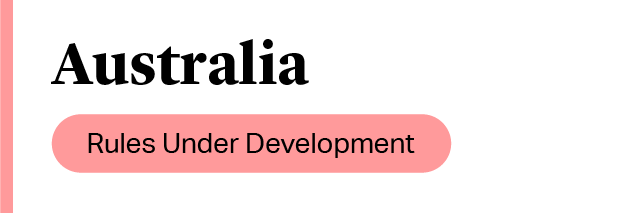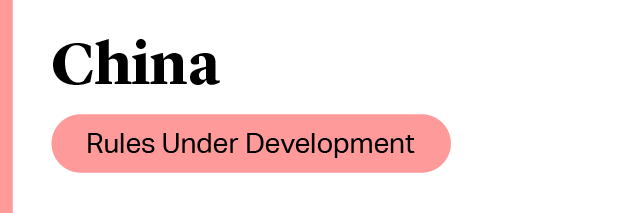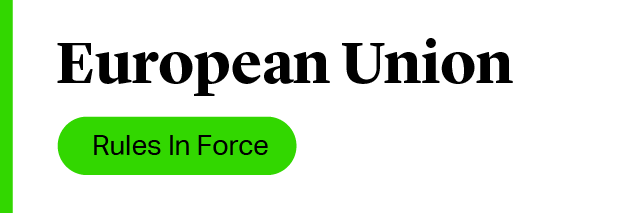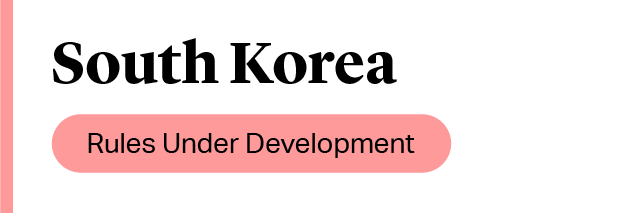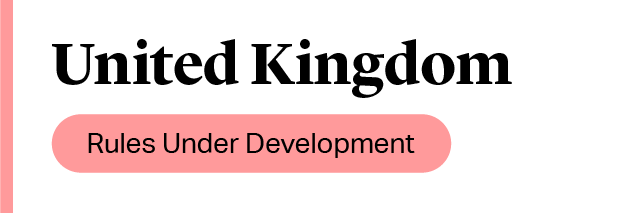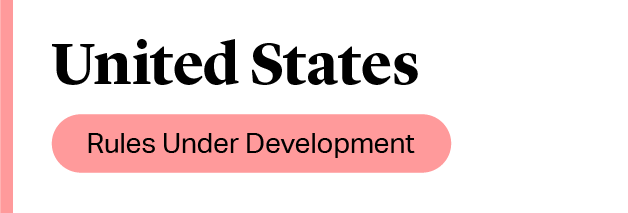Japan
In Japan, competition in digital markets is mainly governed by general competition laws. The only current regulation that specifically targets competition in digital markets is the Act on Improving Transparency and Fairness of Digital Platforms, which came into force in 2021. This is a platform-to-business regulation, and its scope is fairly narrow. The Government is considering ex ante regulations for mobile ecosystems. A new set of regulations on competition in digital markets could therefore be forthcoming in the next year.
Authored by Fay Davies
Updated as of April 2024

Japan
In Japan, competition in digital markets is mainly governed by general competition laws. The only current regulation that specifically targets competition in digital markets is the Act on Improving Transparency and Fairness of Digital Platforms, which came into force in 2021. This is a platform-to-business regulation, and its scope is fairly narrow. The Government is considering ex ante regulations for mobile ecosystems. A new set of regulations on competition in digital markets could therefore be forthcoming in the next year.
Authored by Fay Davies
Updated as of April 2024

-
1. What rules govern competition in digital markets in Japan?
-
Digital markets are governed by general competition law in Japan, including the Antimonopoly Act (“AMA”). The Japan Fair Trade Commission (“JFTC”) amended its Merger Review Guidelines in 2019 to apply the AMA more effectively in digital markets. For example, the Guidelines now specify that the JFTC will examine network effects in mergers where relevant.
Beyond general competition law rules, there is one new law and a potential set of new regulations that govern competition in digital markets in Japan:
- Act on Improving Transparency and Fairness of Digital Platforms. In May 2020, the Government introduced the Act on Improving Transparency and Fairness of Digital Platforms (“TFDPA”) to address transparency and fairness issues in digital markets. The TFDPA entered into force in February 2021. The TFDPA is a platform-to-business regulation that imposes a code of conduct on certain platform operators. Initially, it applied only to app stores and online marketplaces. In July 2022, the TFDPA’s scope was expanded to include digital ads services.
- Potential new rules. A draft bill on new digital regulations for providers of mobile ecosystems is expected in early 2024. The regulations would address potential competition concerns in different layers of mobile ecosystems, including operating systems, browsers, app stores, search engines, and other digital products. The precise scope and framework of any new regime is still uncertain, but is likely to be similar in style to the EU Digital Markets Act.
-
2. What is the status of any forthcoming digital regulation in
Japan?
-
After a year-long consultation on potential digital markets regulation, the government (through an inter-ministry organization called the Digital Market Competition Headquarters (“DMCH”) published a Final Report on 16 June 2023.1 The Report proposes two forms of digital markets regulation: co-regulation involving voluntary efforts by platform operators, and an ex ante, DMA-style framework.
In late 2023, the DMCH said it would conduct a hearing and then draft a bill, potentially for the parliamentary session to be held early 2024.
-
3. How are the rules enforced or expected to be enforced?
-
Ordinary competition rules are enforced by the JFTC. The Government Ministry of Economy, Trade and Industry (“METI”) enforces the TFDPA. It is too early to say how the new regualations resulting from DMCH process will be enforced, but it seems likely that it will involve voluntary efforts from platform operators as well as stricter, ex ante rules.
-
4. Which firms do the rules apply to?
-
The TFDPA applies to “Specified Digital Platform Providers”. To date, METI has designated the following firms as Specified Digital Platform Providers:2
- Online shopping marketplaces: Amazon.co.jp, Rakuten Ichiba, and Yahoo! Shopping.
- App stores: Apple's App Store and Google's Play Store.
- Digital ads platforms:
- Media-integrated digital ad platform providers: Google (Google Search and YouTube), Meta (Facebook, Messenger, and Instagram), and Yahoo! Japan.
- Ad intermediary digital platform providers: Google.
The potential new DMCH rules would likely apply to large providers of mobile ecosystems.
-
5. What are the main substantive rules that govern the firms covered
by the digital regulation?
-
Under the TFDPA, Specified Digital Platform Providers must:
- Disclose their terms and conditions and other information (such as criteria for refusals to deal and for determining search ranking);
- Voluntarily develop procedures and systems to ensure transparency and fairness on their platforms; and
- Submit to METI an annual report with a self-assessment, explaining the measures they have taken to comply.
METI will review the annual report of each Specified Digital Platform Provider and publish an assessment of the transparency and fairness of each firm. Specified Digital Platform Providers will be expected to make voluntary improvements based on the results of those assessments. If METI suspects that a Specified Digital Platform Provider is violating the Antimonopoly Act, it can request the JFTC to take action.
For the potential new regulations, the DMCH is exploring concerns around the following broad areas:
- Pre-installation and defaults;
- Self-preferencing;
- Collection and use of data to the platform operator’s competitive advantage;
- Interoperability;
- Practices that might restrict the user from leaving the platform operator’s ecosystem; and
- Transparency and disclosure to digital platforms’ business users.
-
6. Are there specific rules governing digital platforms’
relationships with publishers?
-
No. The DMCH is not currently considering specific rules governing digital platforms’ relationships with publishers.
-
7. Does the authority need to establish the effects of certain
conduct in order to establish a breach of the new or proposed rules?
-
TFDPA:
No. METI assesses compliance with the TFDPA rules based on the annual reports submitted by the Specified Digital Platform Providers. Stakeholders may be invited to contribute to METI’s assessments. The results of the assessment are published along with a summary of the annual report submitted by the Specified Digital Platform Providers.
Where METI has any suspicion that a given Specified Digital Platform Provider is in violation of the AMA, it will refer the matter to the JFTC.
Potential new rules:
It is not clear how any potential new rules would apply in practice and whether an effects analysis would be required, but the direction of travel seems to be toward an ex ante framework together with voluntary co-regulation.3
-
8. Can firms defend or objectively justify their conduct under the
new or proposed rules?
-
The TFDPA does not expressly provide that firms can objectively justify their conduct. METI assesses Specified Digital Platform Providers’ conduct based on the annual reports they submit. There is nothing to prevent providers from including objective justifications in their reports.
It is too early to say definitely whether potential new DMCH rules would allow firms to defend or objectively justify their conduct, but it seems likely. The DMCH’s Final Report recommends that any regulatory framework should provide the opportunity for firms to justify their conduct.4
Some obligations may also provide expressly for justifications and proportionality thresholds. For example, in relation to a proposed obligation for OS providers to enable interoperability with third-party services, the DMCH notes that “it is assumed that necessary and proportionate measures can be taken to ensure privacy”.5
-
9. What procedural safeguards are there under the new or proposed rules?
-
The TFDPA does not provide for express procedural safeguards, but usual competition procedures would apply if METI referred a case to the JFTC. JFTC decisions can be appealed before Japanese courts under the AMA and general administrative litigation legislation. It is too early to say what kinds of procedural safeguards are being considered under potential new DMCH rules.
-
10. What kinds of penalties or remedies can be imposed following a
breach of the new or proposed rules?
-
A Specified Digital Platform Provider can be fined up to JPY 1 million (approximately USD 7,000) if it breaches an order issued by METI requesting it to perform disclosure obligations properly. These orders can be issued if the platform fails to implement a METI recommendation without justification.
A platform can be fined up to JPY 500,000 (approximately USD 3,500) if it fails to file an annual report, fails to provide necessary information in an annual report, or makes a false statement in an annual report.
¥0A PLATFORM CAN BE FINED UP TO JPY 500,000 (APPROXIMATELY USD 3,500) IF IT FAILS TO FILE AN ANNUAL REPORT, FAILS TO PROVIDE NECESSARY INFORMATION IN AN ANNUAL REPORT, OR MAKES A FALSE STATEMENT IN AN ANNUAL REPORT.It is too early to say what kinds of remedies could be imposed under the potential new DMCH rules, but the DMCH’s Final Report proposes a range of measures, including financial penalties, orders to correct behaviour, urgent injunctions, and the possibility of private enforcement.6
-
11. Has the authority issued any guidance or reports regarding the
digital regulation?
-
METI has issued various pieces of guidance on aspects of the TFDPA.7
The DMCH has issued:
- A summary of its Final Report in English.8 The full version of the Final Report is only available in Japanese.
- A summary of its Interim Report in English.9 The full version of the Interim Report is only available in Japanese.10
-
12. Has the authority issued any decisions under the digital
regulation in this jurisdiction?
-
So far, METI has only issued decisions designating Specified Digital Platform Providers under the TFDPA (see Question 4).
-
13. Is the new regime competition based, or does it target other
types of conduct, such as consumer protection, moderation of content, or
privacy?
-
The potential new DMCH rules will be competition based. The TFDPA is a broader platform-to-business regulation that is mainly about promoting transparency in platforms’ dealings with the listed businesses on the platform.
-
14. What is the current enforcement practice with respect to conduct
that is expected to be addressed by the digital regulation?
-
The JFTC has increased its scrutiny of conduct in digital markets over the past few years. For example:
- Investigation into Amazon’s conduct on online marketplaces (closed in 2017). The JFTC investigated Amazon Japan for a suspected breach of the AMA due to its use of most favored nation clauses in seller contracts. Amazon agreed to remove the relevant clauses from contracts (or waive its right to exercise them), and not to include the clauses in future contracts.11
- Investigation into Airbnb for alleged exclusionary practices (closed in 2018). The JFTC investigated Airbnb on suspicion that it was restricting competition by preventing property owners from listing properties on websites other than Airbnb. Airbnb agreed to waive its right to enforce the offending provisions.12
- Investigation into Apple for its agreements with mobile network operators (closed in 2018). The JFTC investigated Apple for potential breaches of the AMA through its sales contracts with mobile network operators. The JFTC found that Apple was distorting competition by requiring three mobile network operators to offer users a plan with a lower upfront cost but potentially higher monthly costs. Apple did not allow the operators to offer any other type of iPhone plan. Apple agreed to change its sales contracts to remedy this concern.13
- Investigation into Apple’s conduct on its App Store (closed in 2021). The JFTC investigated Apple on suspicion that certain App Store practices breached the AMA. For example, the App Store Guidelines stipulated that app developers selling digital content through their apps had to use Apple’s in-app payments system, which charges a fee of 15-30%. The JFTC found that this could restrict competition from other potential sales channels. Apple agreed to allow “reader” apps like Netflix, Spotify, and Hulu to include an in-app link to allow users to make payments through their websites.14
- Investigation into Expedia MFNs (closed in 2022). The JFTC investigated Expedia on suspicion that its use of wide MFNs violated the AMA. The JFTC accepted commitments from Expedia to remove wide price parity clauses from contracts with accommodation providers.15
- Report on cloud services (2022). The JFTC published the results of a survey on trade practices in the public cloud sector. The report sets out the JFTC’s assessment of the competitive environment, potential concerns and recommendations. The JFTC resolved to “continue to watch the state of competition in this sector”.16
- Market study on mobile OS and mobile app distribution (2023). The JFTC published the results of a market study into the market for mobile OS and app distribution, focusing on Apple and Google.17 In its press release announcing the final report, the JFTC notes that it will continue to “respond strictly and appropriately to concrete cases involving a mobile OS provider or an app store operator that become problematic under the Antimonopoly Act”.18
-
15. Are there merger rules specific to digital platforms in Japan?
-
No. However, in April 2022, the JFTC announced the creation of a new office specialized in market analysis for the review of, among others, digital-related mergers.
This proposal followed the publication of a revised set of merger review guidelines in December 2019,19 which introduced significant amendments to better capture transactions in the digital sector. Under the new guidelines, parties to a merger that does not meet the notification thresholds but has a transaction value over JPY 40 billion (approximately USD 275 million) and is expected to affect Japanese consumers are strongly encouraged to voluntarily consult with the JFTC. The revised guidelines also mention data foreclosure and network effects as elements to be considered in the substantive assessment of a merger.
Contacts
Henry Mostyn
Partner
Fay Davies
Associate





